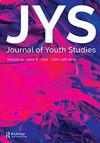西班牙成年早期照顾健康的后果
IF 2.2
3区 社会学
Q1 SOCIAL SCIENCES, INTERDISCIPLINARY
引用次数: 0
摘要
摘要随着老年人护理需求的增长和家庭护理人员的减少,年轻的非正式护理人员越来越重要。照顾孩子可能是一件紧张而耗时的事情,而且与教育程度、收入和健康状况较差有关。尽管有必要了解护理在西班牙成年早期的影响,在那里,对依赖成年人的公共护理支持很少,但尚未有研究调查这一现象。在这里,我们使用2017年和2019年的西班牙和欧洲健康调查来分析17至29岁之间提供无偿护理与慢性疾病和精神健康状况之间的关系。结果表明,与同龄的非照护者相比,年轻的成年照护者更有可能患上慢性病(每周提供少于10小时的照护时),并报告精神健康状况(每周提供20小时或更多的照护时)。然而,在患有慢性疾病的情况下,控制内生性使得这种关系在统计上不显著。这表明,患有慢性疾病的年轻成人护理人员可能更容易从事要求较低的护理活动,而密集的护理可能会导致更多的心理健康问题。关键词:护理人员;青少年健康;西班牙披露声明作者未报告潜在的利益冲突。本研究得到了欧洲研究委员会的支持:[资助号ERC-2019-COGagreement No 864616, HEALIN];“让岁月更美好,让生活更美好”联合规划计划[批准号PCI2021-121983];科技部Innovación:[资助号PID2019-111666RJ-I00];科技部Tecnología:[批准号:RYC-2013-14851]。研究中心通过“Ramón y Cajal”项目获得了西班牙科学与创新部的资助。ryc - 2017 - 22586);ML承认西班牙科学与创新部,国家研发与创新计划QUALYLIFE (PID2019-111666RJ-I00)的资助。CERCA方案(加泰罗尼亚政府)也提供了支持。本文章由计算机程序翻译,如有差异,请以英文原文为准。
The consequences of caring on health during early adulthood in Spain
ABSTRACTYoung informal carers are gaining importance due to the growing demand for older care needs and the reduction of available family carers. Caring can be intense and time-consuming, and is associated with lower educational attainment, income and poorer health. Despite the need to understand the impact of care during early adulthood in Spain, where public care support to dependent adults is scarce, no studies have yet investigated this phenomenon. Here we use the Spanish and European Health Surveys from 2017 and 2019 to analyse how providing unpaid care between the ages of 17 and 29 is associated with having a chronic condition and a mental health condition. Results indicate that young adult carers are more likely to experience chronic conditions (when providing less than 10 hours of care per week) and to report mental health conditions (when providing 20 hours or more of care per week) compared to non-carers of the same age. Howeverh, controlling for endogeneity in the case of having a chronic condition makes the relationship statistically insignificant. This suggests that young adult carers with chronic conditions may be more available to engage in less demanding caring activities, whereas intensive caregiving may lead to more mental health problems.KEYWORDS: carecaregiveryoung adultsmental healthSpain Disclosure statementNo potential conflict of interest was reported by the author(s).Additional informationFundingThis work was supported by European Research Council: [Grant Number ERC-2019-COGagreement No 864616, HEALIN]; Joint Programming Initiative More Years, Better Lives: [Grant Number PCI2021-121983]; Ministerio de Ciencia e Innovación: [Grant Number PID2019-111666RJ-I00]; Ministerio de Ciencia y Tecnología: [Grant Number RYC-2013-14851]. ER obtained funding from the Spanish Ministry of Science and Innovation through the ‘Ramón y Cajal’ programme (Refs. RYC-2017-22586); ML acknowledges funding from the Spanish Ministry of Science and Innovation, National R&D&I Plan QUALYLIFE (PID2019-111666RJ-I00). Support also came from CERCA Programme (Generalitat de Catalunya).
求助全文
通过发布文献求助,成功后即可免费获取论文全文。
去求助
来源期刊

Journal of Youth Studies
SOCIAL SCIENCES, INTERDISCIPLINARY-
CiteScore
5.00
自引率
10.50%
发文量
82
期刊介绍:
Journal of Youth Studies is an international scholarly journal devoted to a theoretical and empirical understanding of young people"s experiences and life contexts. Over the last decade, changing socio-economic circumstances have had important implications for young people: new opportunities have been created, but the risks of marginalisation and exclusion have also become significant. This is the background against which Journal of Youth Studies has been launched, with the aim of becoming the key multidisciplinary journal for academics with interests relating to youth and adolescence.
 求助内容:
求助内容: 应助结果提醒方式:
应助结果提醒方式:


